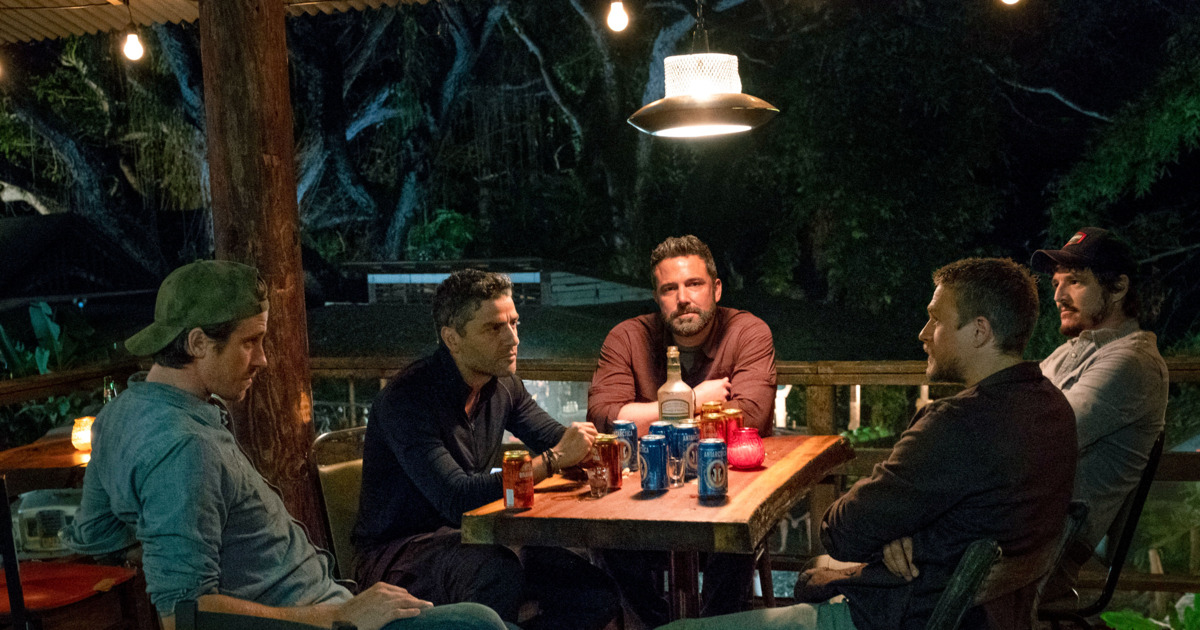
************************This review contains spoilers****************************
In Triple Frontier, former Special Forces operative and current mercenary Santiago “Pope” Garcia (Oscar Issac) becomes disenchanted after a career of service for the United States military and years of attempting to put a dent in the drug operations of South American drug lord Gabriel Martin Lorea (Reynoldo Gallegos) and decides to recruit fellow former soldiers Tom Davis (Ben Affleck), Bill Miller (Charlie Hunnam), Ben Miller (Garrett Hedlund), and Francisco Morales (Pedro Pascal) to plan a heist on Lorea’s hidden compound in a sparsely populated multi-border zone of South America. Despite their intense planning, the crew’s first ever mission meant to serve themselves instead of their country doesn’t go according to plan and gradually spirals out of control. The quintet is forced to utilize all of their skills in order to survive.
Triple Frontier is an intense study on the insidious, slow creeping dangers of greed and vengeance and the specific kind of violence they lead to; one that continually fuels itself. The entire heist plan hatched by Pope is borne of greed and vengeance, with the mercenary seeking to finally rid the region he had spent so much time in, and witnessed so much death around, of the menace of Lorea while getting rich in the process; spoils that he felt owed after years of service in the military with little to show for the completion of his missions. The element of greed inherent in the plot is what causes the operation to go awry as Tom, upon actually seeing the amount of cash hidden in Lorea’s compound as opposed to merely speculating about it, becomes consumed with stealing as much as he can, regardless of their ability to steal it and still stay within the plan that he himself laid out in painstaking detail.
What was striking about the effect of greed in the film is how quickly Tom was turned at the prospect of immense riches. Greed has been characterized as an addiction where, in terms of greed as it pertains to wealth, the addiction is attaining more rather than just attaining money itself. We see this when Tom angrily implores the group to find more bags to carry more money with little regard to their planned window of time or the ability to carry it. He became singularly focused on just getting more at the expense of all else, eventually leading to the failure of the mission after the weight of the unexpected extra cash leads to their getaway helicopter crashing in the Andes. Here, Tom’s greed leads to him killing numerous villagers who attempt to take some cash from the stranded thieves, igniting the spirit of vengeance already following the crew in the former of a teen from the village who eventually tracks them as they try to escape with the money, taking Tom’s life. The intersection of greed and vengeance is made plain and how the two feed off each other in a dangerous cycle. Pope’s need to seek vengeance for Lorea’s reign of terror, for his feelings of abandonment from the government and military he served put his friends in a precarious position while Tom’s succumbing to greed during the heist eventually led to his own death.
Triple Frontier also operates as a sort of allegory for post-9/11 warfare, in particular the events of the second Iraq War, Operation Iraqi Freedom. The parallel between the doomed military operation and the heist at the center of this film was done intentionally by co-writer/director JC Chandor and fit perfectly upon reflection. Just as the American public was sold on the 2003 invasion of the country, Pope convinces his ex-military friends that their invasion and robbery of Lorea’s remote compound will be a quick and easy operation where they would encounter little resistance and leave with riches beyond their comprehension. And just as with the Iraq war, once the crew gets there, they find more obstacles than they anticipated and in the end, they leave with not only none of the money they were promised, but with unexpected loss of life. Triple Frontier seeks to be a realistic, thought provoking statement on the military and the psyche of soldiers as much as an entertaining heist film and its plot points aimed at this are well executed. The actors do a good job of imparting on the audience what effects a lifetime of killing for a flag can have on human beings of varying personality types, with Pope’s feeling neglected or Bill’s feeling of guilt and regret. The message is that these acts stay with a person for the rest of their lives and too often, they’re left to sort through them alone.
Triple Frontier is a well done heist film that builds tension up to and during the heist that keeps viewers invested and engaged in the outcome. It differs from your traditional heist film in that the actual heist occurs fairly early in the film rather than as an explosive finale, with the struggle for survival following the inevitable botched operation serving as the conflict for the rest of the film. The connections between the ensemble cast feel genuine, helping to make the crux of the story believable. Triple Frontier is a quality take on the heist thriller and worth a watch.
Image: Netflix

